Middle East
Analysis: Call to disband PKK reshapes Turkiye, Syria power dynamics | Syria’s War News
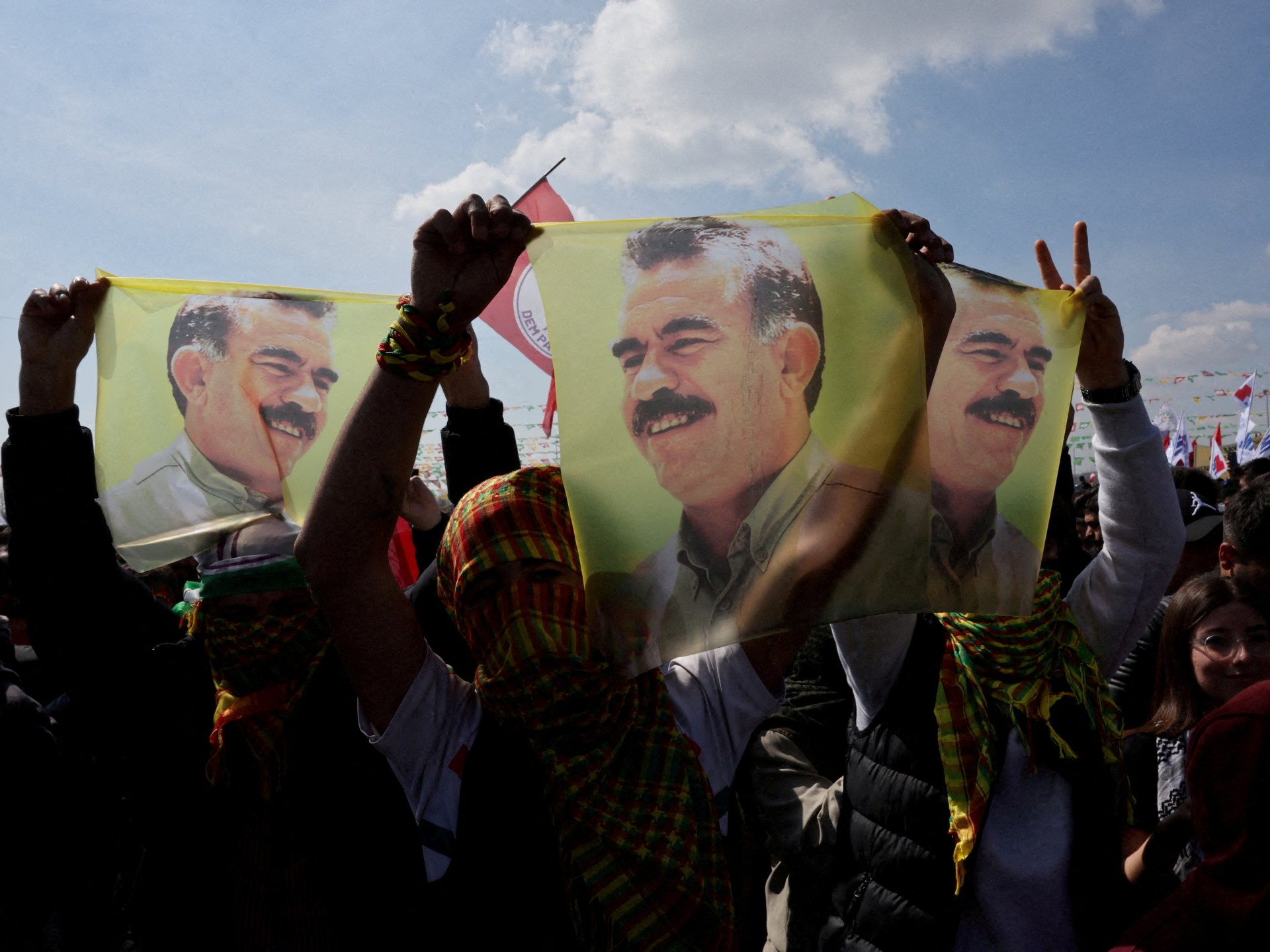
The consequences of the call by the founder of the Kurdistan Workers’ Party (PKK), Abdullah Ocalan, for the group to disband are still reverberating – not just in Turkiye but also in the wider region.
Shifting alliances in Syria – exemplified by the recent agreement between the Kurdish-led Syrian Democratic Forces (SDF) and the Syrian government – confirm that Ocalan’s message is not isolated or purely domestic but offers a crucial opportunity that could redefine everything from Turkiye’s security policies to the future positioning of Kurdish actors, shaping the next phase of regional power dynamics.
Ocalan, in a statement delivered from a Turkish prison in late February, called on the PKK to “convene your congress and make a decision. All groups must lay down their weapons, and the PKK should dissolve itself.”
The PKK leadership – from its longstanding command centre in Iraq’s Qandil Mountains – responded to Ocalan’s call by declaring a unilateral ceasefire with final disbandment as well as decisions on disarmament and other matters delayed until the congress can be held in a month or two. Turkiye remains firm in its demand that all PKK-affiliated groups, including its Syrian offshoots, must disband unconditionally.
The PKK’s decades-long conflict with Turkiye has killed more than 40,000 people. Ocalan, in addition to being the leader of the movement ideologically, also led the group’s armed rebellion until his capture in 1999. The PKK is considered a terrorist organisation by Turkiye, the United States and the European Union.
While Ocalan has advocated for ceasefires in the past, this is the first time he has called for the PKK to cease to exist, the reason for this likely being linked to shifts in Kurdish political movements, Turkish state strategy and broader regional realignments, especially the evolving dynamics in Syria.
Removing the Kurdish ‘fear factor’
The diminishing strategic value of armed struggle has coincided with the rise of Kurdish political actors, weakening the PKK’s role as a “fear factor” in Turkish politics.
Once instrumental in mobilising nationalist votes for the ruling Justice and Development Party (AK Party), the PKK’s influence is fading as pro-Kurdish politics gain traction.
The Peoples’ Democratic Party (HDP) broke new ground in June 2015 by surpassing the 10 percent electoral threshold required to secure parliamentary representation – an achievement that pro-Kurdish parties had previously managed only by running independent candidates.
Today, the party now known as the Peoples’ Equality and Democratic Party (DEM) plays a pivotal role in elections as Kurdish votes shape Turkiye’s political landscape.
Against this backdrop, Ocalan’s call for the PKK’s disbandment is an effort to expand the space for Kurdish political representation within the democratic system.
Kurdish political mobilisation through political parties has become more powerful and influential than armed struggle.
The growth has not been unimpeded as state-imposed restrictions have continued.
For example, Selahattin Demirtas, the former leader of the HDP and a former presidential candidate, remains imprisoned, and Kurdish politicians and activists accused by the government of being close to the PKK face harsh sentences under “anti-terror” laws.
After the 2024 municipal elections, the government once again appointed trustees in some Kurdish-majority municipalities, preventing elected mayors from the DEM party from taking office.
These restrictions, however, may begin to ease with the gradual normalisation of pro-Kurdish politics, which could emerge as a result of the removal of the “terrorist” label from the broader movement and the construction of a new narrative that positions pro-Kurdish representatives as recognised political actors.
Turkiye’s stake
For the AK Party, consolidating electoral support requires a delicate balance between addressing Kurdish demands – and gaining those votes – and maintaining Turkish nationalist backing.
Had this initiative to talk to the PKK been driven solely by President Recep Tayyip Erdogan without the involvement of Nationalist Movement Party (MHP) leader Devlet Bahceli, who had long opposed any solution other than a military one, nationalist opposition to it would have been far more pronounced.
By having Bahceli invite Ocalan to address parliament and advocate for the “right to hope” – a measure supporting the release of individuals, including Ocalan, who have served 25 years – and engage in dialogue with DEM figures he had previously labelled as “terrorists”, the government has managed to pre-emptively contain hardline resistance, making the transition more politically viable.
A successful peace process could help rekindle support for the AK Party among Kurdish voters who had turned away from the party since the collapse of the Turkiye-PKK peace process in 2015 and the government’s turn towards Turkish nationalism – as well as attract a new generation of Kurdish voters.
On the other hand, opposition within Turkiye to such a development remains a wild card. Hardline factions within the government and in nationalist circles are likely to resist any perceived concessions to pro-Kurdish political actors.
Externally, the “Kurdish issue” has long been an obstacle in Turkiye’s foreign relations, particularly with Western allies and the EU, for which Turkiye remains a candidate country.
Concerns over rights and liberties, the undermining of Kurdish rights and political representation, the imprisonment of Kurdish politicians and Western support for Kurdish groups fighting ISIL (ISIS) in Syria have all contributed to tensions in Turkiye’s foreign relations.
By proactively managing this transition, Ankara could frame itself as the architect of Kurdish political normalisation, strengthening its stance both regionally and internationally.
Meanwhile, the reality that neither Turkiye nor the PKK can achieve absolute victory militarily has become increasingly clear. The decline in active conflict within Turkiye has also reshaped public perception.
Turkiye’s military operations in Syria – Euphrates Shield (2016-2017), Olive Branch (2018) and Peace Spring (2019) – shifted the primary battleground from Turkiye’s border areas into northern Syria, where clashes between the Turkish-backed Syrian National Army (SNA) and Syrian Kurdish forces continue.
This strategy has not only established Turkish-controlled zones but also altered the conflict’s geography, reducing direct threats to Turkiye while intensifying power struggles in Syrian areas like Afrin, Ras al-Ain, and Tal Abyad.
The PKK’s disbandment is not a done deal, however, and opposition parties, particularly the Republican People’s Party (CHP), which is desperately eager to end the AK Party’s 23-year rule, remain hesitant to support the initiative.
While the CHP officially endorses a peaceful resolution to the “Kurdish issue”, it is sceptical of a process led by Erdogan’s government, not knowing what may be unfolding in closed-door negotiations.
Moreover, the CHP is cautious about lending legitimacy to a process that could strengthen the AK Party’s appeal among Kurdish voters, particularly with elections in the future.
For now, it has adopted a wait-and-see stance because the only thing known is the intent of the PKK to dissolve rather than its actual mechanisms.
![Abdullah Ocalan, the jailed leader of the outlawed Kurdish militant group PKK, is seen with politicians and lawmakers of the pro-Kurdish Peoples' Equality and Democracy Party (DEM Party) Ahmet Turk, Pervin Buldan, Sirri Sureyya Onder, Tulay Hatimogullari, Tuncer Bakirhan, Cengiz Cicek and Faik Ozgur Erol, in Imrali Island prison, in Marmara Sea, in Turkey, February 27, 2025. [Peoples' Equality and Democracy Party Handout via Reuters]](https://www.aljazeera.com/wp-content/uploads/2025/02/2025-02-27T151559Z_1225325094_RC203DAC3IJM_RTRMADP_3_TURKEY-KURDS-OCALAN_cropped-1740682662.jpg?w=770&resize=770%2C433)
The Syrian equation
Ocalan’s appeal reflects a broader shift as nonstate armed groups across the region face growing pressure to adapt for survival and legitimacy.
In northern Syria, a strategic priority for the Democratic Union Party (PYD) and its armed wing – the People’s Defence Units (YPG), which is the core force in the US-backed SDF – is preserving their territorial and political position.
Set up in 2003 as a PKK offshoot, the PYD came into its own in northern Syria and has been targeted in military offensives by Ankara and Ankara-supported groups in Syria, such as the SNA.
Ocalan may have been motivated by a hope that a disbanded PKK would result in fewer direct confrontations between Turkiye and the PYD, possibly helping the PYD keep a level of self-administration and rights within the new Syrian state and constitution.
An important step in this direction came on Monday when the SDF signed an agreement in Damascus with interim President Ahmed al-Sharaa for their forces to merge with the Syrian army and cooperate on several economic, social and political fronts.
Whether this will be enough for Turkiye to relent in its pursuit of the SDF depends on the details of the agreement and its implementation. So far, the agreement has been supported by Erdogan, who emphasised that the full implementation of the agreement would serve Syria’s security and stability and benefit all Syrians.
Public statements by Foreign Minister Hakan Fidan previously showed that Turkiye aims to shape the terms of the PYD’s acceptance within a reconfigured Syrian framework by calling for the removal of foreign PKK elements, dismantling the YPG’s military leadership and integrating the PYD into the Syrian state without its armed wings or territorial ambitions.
What’s likely to follow?
A resolution of the “Kurdish issue” could enhance Turkiye’s diplomatic leverage, especially with European and American actors critical of its policies against Kurds domestically and in neighbouring states.
A sustainable process may also ease tensions with Iraq and Syria, where Turkiye’s operations against Kurdish groups have caused friction. This would further strengthen security and economic cooperation with Baghdad and the new government in Damascus.
While legislative steps will play a crucial role in facilitating this transition, a well-defined roadmap with legal, political and social adjustments is necessary.
The focus will soon shift to the future of PKK fighters. According to intensifying public debate in Turkiye, several potential pathways exist.
Some may receive legal amnesty and reintegration support. Others may be absorbed into legitimate Kurdish political structures, and some senior leaders may be relocated to third countries with their current base in Iraq being a likely destination.
Ultimately, the sustainability of this process will be determined by meaningful democratic reforms, expanding cultural and political rights, safeguarding civil liberties and paving the way for a new democratic constitutional framework as a foundation of a more inclusive political order.

However, based on declarations by Turkiye’s state actors, the current vision does not include any of these major reforms. How the PKK’s dissolution could occur without these fundamental changes remains an open question. For its fighters, a legal framework will be a necessity for disarmament, demobilisation and reintegration.
While some figures within the DEM advocate for a fast-tracked process to consolidate their political standing and deliver gains for their constituents, AK Party politicians could be motivated by electoral concerns, seeking a resolution that neutralises tensions without making deep structural concessions.
The PKK’s ceasefire is a notable first step, but its long-term viability depends on how to institutionalise it, which a purely tactical or rushed settlement could not provide.
At the same time, it is crucial to recognise that no peace process can be built on uncompromising demands or an idealised, frictionless roadmap.
Sustainable peace requires pragmatic solutions, gradual steps, and an acceptance that negotiations will involve setbacks, competing interests and the necessity of mutual concessions.
Middle East
Deadly, sombre Good Friday as 58 people killed in Israeli attacks on Gaza | Israel-Palestine conflict News
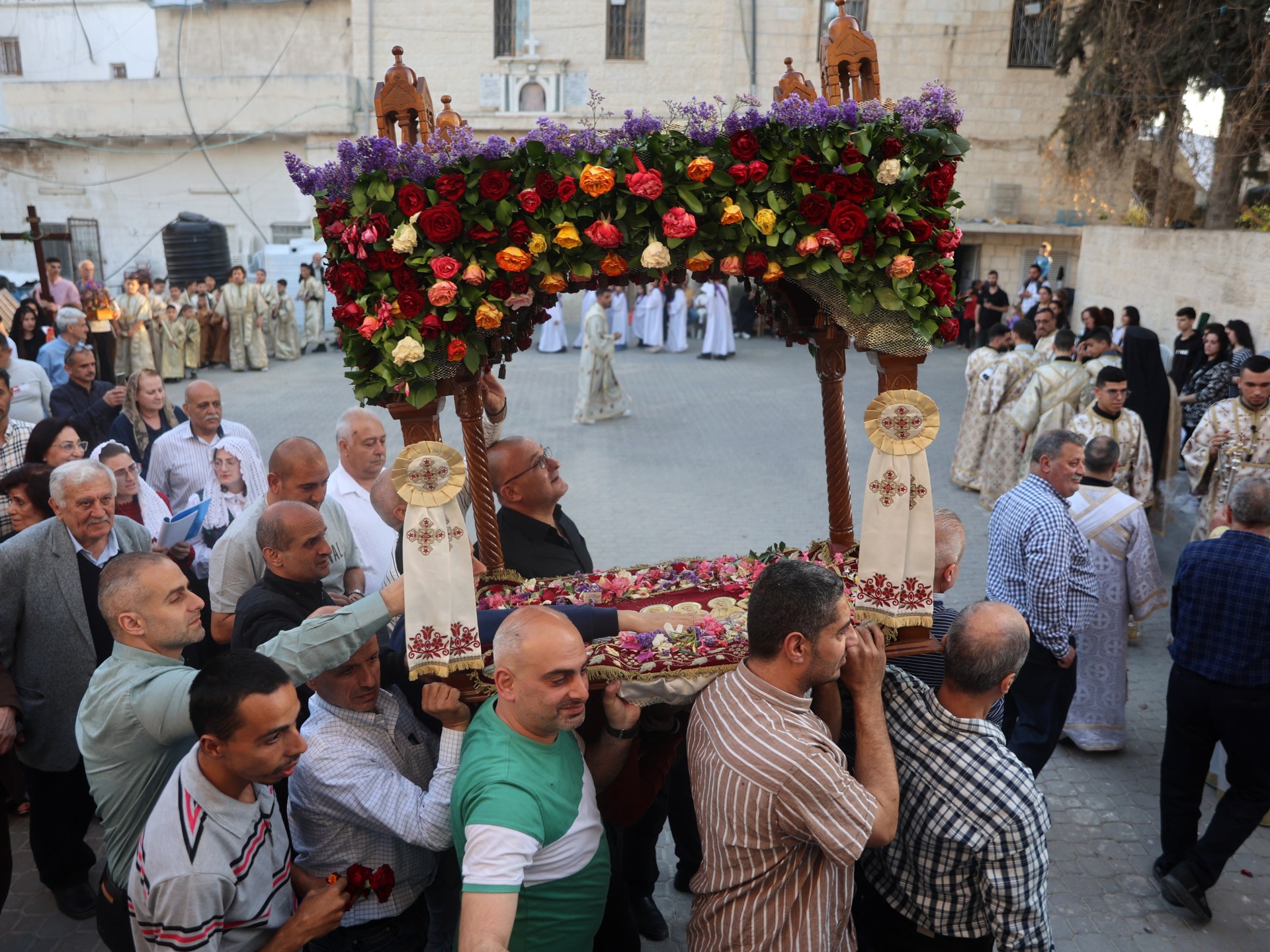
Palestinian Christians in Gaza and the occupied West Bank are holding temperate gatherings leading up to Easter.
Israeli strikes on Gaza have killed at least 58 Palestinians in one day as Christians mark Good Friday in the besieged and bombarded enclave.
More than half of the casualties were in Gaza City and northern Gaza, but deadly attacks took place across the Palestinian Strip, including in Khan Younis and Rafah in the south, medical sources told Al Jazeera on Friday.
The Israeli military said troops were operating in the Shaboura and Tal as-Sultan areas near Rafah, as well as in northern Gaza, where Israel has taken control of large areas east of Gaza City.
On Friday, Israel’s defence minister, Israel Katz, repeated that Israel intended to achieve its war aims.
“The [Israeli army] is currently working towards a decisive victory in all arenas, the release of the hostages, and the defeat of Hamas in Gaza,” he said in a statement.
Palestinian Christians in Gaza however continued to hold temperate gatherings leading up to Easter, amid the attacks.
Speaking to Al Jazeera from a local church, Ihab Ayyad said he used to gather with other congregants and visit his neighbours’ homes every year to celebrate.
“This year, we didn’t make the visits because of the total destruction everywhere, as the [Israeli] occupation forces have levelled most of the houses of my relatives and my neighbours,” Ayyad said. “A lot of my relatives and neighbours were martyred or displaced in different places. We haven’t celebrated because we feel very sad.”
Ramez al-Soury said he used to travel out of Gaza to Bethlehem or Jerusalem for the holy week.
But now, an “atmosphere of war” permeates Gaza. “The death smell is everywhere. The smell of killing and destruction is putting a lot of pressure on us,” he said.
Reporting from Gaza City, Al Jazeera’s Hani Mahmoud said the Christian community is holding onto their faith and has gathered at one of the oldest churches in the world in Gaza – not in defiance but in devotion.
“In Gaza, Good Friday is the power of faith and the quiet strength of those who still believe in peace even when the world around them is nothing but a stage filled with violence and death,” he said.
West Bank settler violence
Rituals to mark Good Friday and Easter have also been held in the occupied West Bank.
There are about 50,000 Palestinian Christians in the region. Israeli authorities, however, require them to acquire permits to travel to Jerusalem, making it difficult for many to join those celebrations.
Moreover, Israeli settlers and the military also attacked Palestinian people on their land in the town of Biddya, in the Salfit governorate in the occupied West Bank, according to Al Jazeera Arabic on Friday, tempering the celebrations.
The Palestine Red Crescent said that a Palestinian was injured in the attack.
Local sources also told Al Jazeera Arabic that dozens of settlers stormed Jabal al-Urma, a hill in the town of Beita in the Nablus governorate, under the protection of the Israeli army.
Settlers are Israeli citizens who live illegally on private Palestinian land in the occupied West Bank and East Jerusalem.
Israeli settler and military violence has soared across the West Bank – particularly in the north of the territory – since the war on Gaza began in October 2023. The United Nations has said this violence has displaced roughly 40,000 Palestinians since Israel began a new military operation in the occupied West Bank in January.
Middle East
Allies say Ghannouchi ‘unjustly’ held, as he marks 2 years in Tunisian jail | Human Rights News
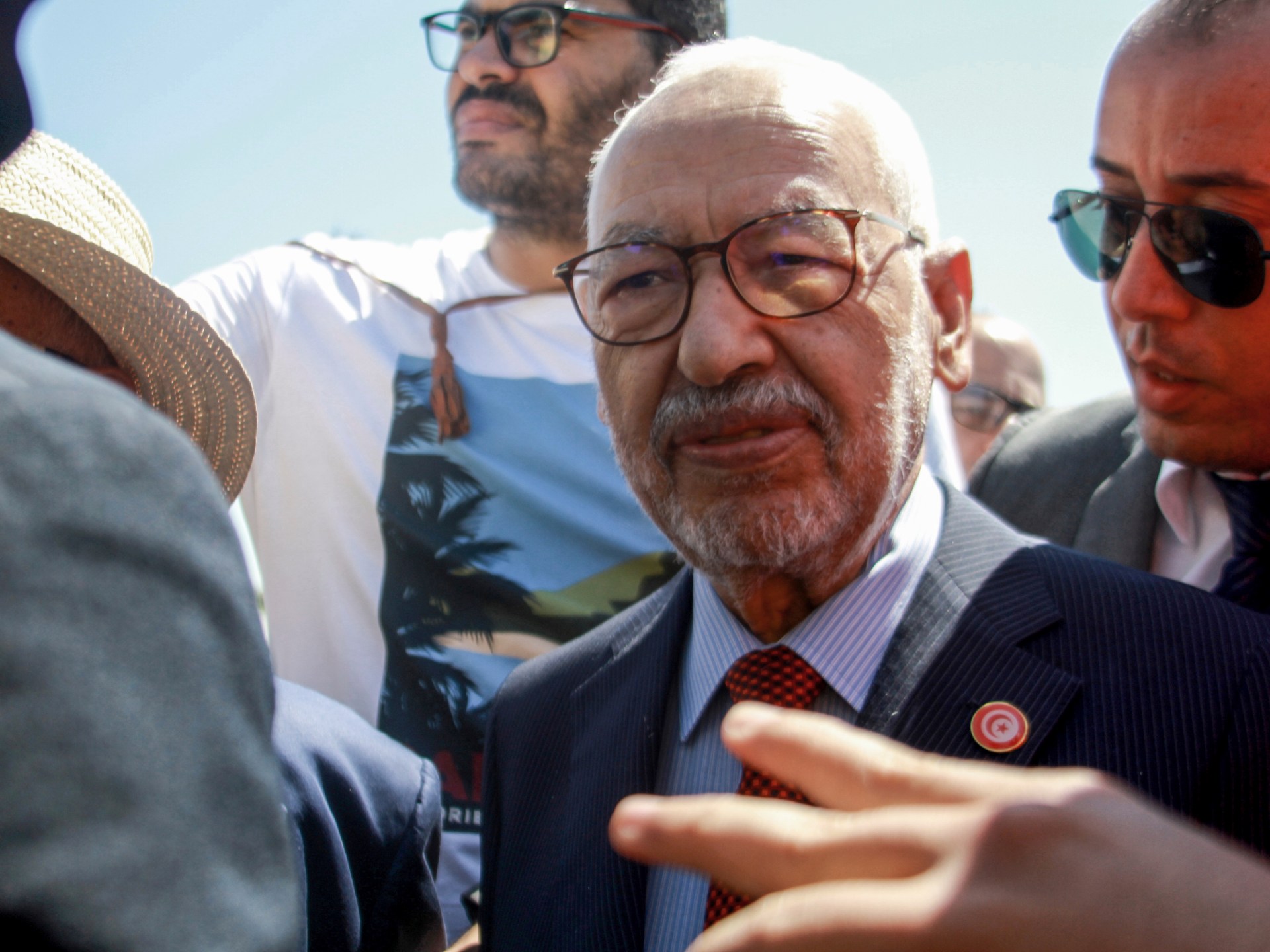
International Committee for Solidarity with Rached Ghannouchi decries ‘repressive campaign’ against Ennahdha party leader.
Marking the second anniversary of the arrest of Tunisia’s prominent opposition leader Rached Ghannouchi, an international committee formed last year to raise awareness about his imprisonment says he is being held “unjustly” and on “trumped-up charges”.
The International Committee for Solidarity with Rached Ghannouchi called for the immediate release of the imprisoned Ennahdha party leader and former speaker of Tunisia’s parliament.
In a statement on Thursday, it said that more than 15 cases have been brought against Ghannouchi, and “several unjust convictions and sentences” have been issued.
The most recent of these was a 22-year prison sentence issued in February on charges that included plotting against state security – a case “to which he has no connection”, the committee said.
Earlier this year, Ghannouchi was also sentenced to three years for accusations that his party received foreign contributions.
The 83-year-old, who has been the main rival of Tunisian President Kais Saied, was arrested in April 2023 and sentenced to one year in prison on charges of incitement.
He has been a vocal critic of Saied, and became the highest-profile figure to be arrested in the continuing consolidation of power by the president who was elected in 2019 and has overseen a wave of repression and legal reforms that have expanded his rule.
“These unjust trials and sentences take place within the context of a widespread repressive campaign led by Kais Saied’s regime, which is targeting opposition voices from all backgrounds, repressing organised action in all its forms, controlling the media and civil society, and silencing critical voices,” the committee said in its statement.
It said Saied’s government has to “exploit the judiciary as a tool for settling political scores”.
‘An era of political prisoners’
The committee’s statement comes just days after United States-based Human Rights Watch (HRW) called on the Tunisian government to halt its crackdown on opposition and free all detainees.
The rights group said arbitrary detention was being used to eliminate dissent in Tunisia amid a trial of prominent opposition figures – including Ghannouchi – on conspiracy charges.
In a report released Wednesday, HRW reinforced opposition leaders’ concern over what they call the authoritarian rule of Saied since he dissolved parliament in 2021 and began ruling by decree.
The opposition described Saied’s move as a coup. He has denied such accusations, professing he would not become a dictator but rather is trying to rescue the North African country from political chaos and rampant corruption.
The report said Tunis had turned arbitrary detention into a cornerstone of repressive policy.
“Saied’s government has returned the country to an era of political prisoners, robbing Tunisians of hard-won civil liberties,” said Bassam Khawaja, deputy Middle East and North Africa director at HRW.
Since 2023, authorities have arrested dozens of prominent political opposition figures as well as journalists, activists and lawyers in a crackdown critics say has undermined the democracy gained in the 2011 Arab Spring popular uprising.
Middle East
At least one killed by Israeli strike near Sidon in southern Lebanon | Israel attacks Lebanon News
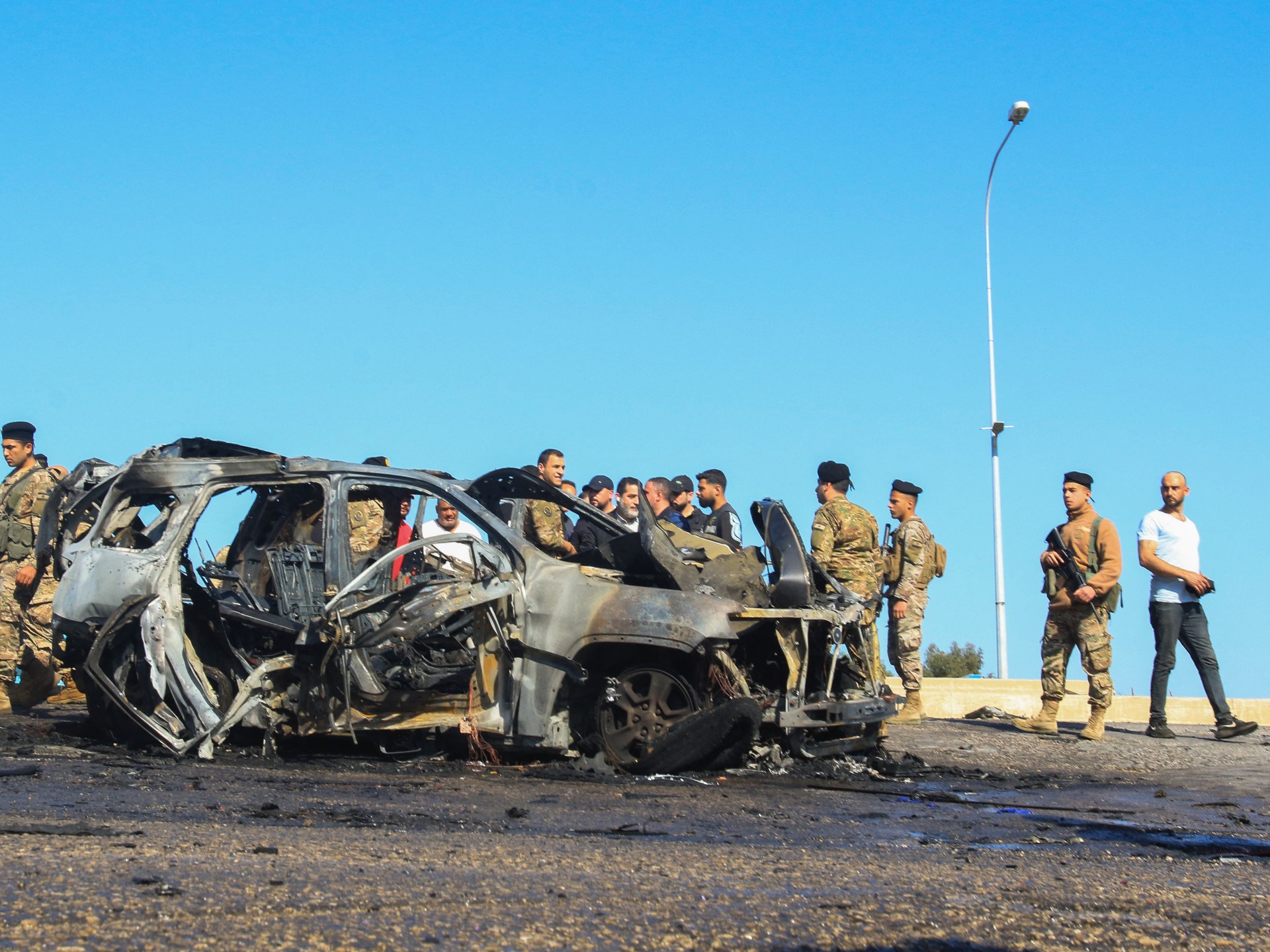
Israel has continued to conduct near-daily strikes in Lebanon despite a ceasefire with Hezbollah last November.
Lebanon’s Health Ministry has said an Israeli strike on a vehicle near the southern coastal city of Sidon killed one person, with Israel announcing that an attack in the same area had targeted a Hezbollah operative.
Despite a ceasefire last November that sought to halt more than a year of conflict between Israel and Iran-backed Hezbollah, Israel has continued to conduct near-daily strikes in Lebanon.
“The attack carried out by the Israeli enemy against a car on the Sidon-Ghaziyeh road resulted in one dead,” a Health Ministry statement said on the fourth consecutive day of Israeli attacks in the south on Friday.
An AFP journalist said the Israeli attack hit a four-wheel-drive vehicle, sending a pillar of black smoke into the sky.
At the scene of the strike, members of the security forces stood guard as a crowd gathered to look at the charred remains of the vehicle after firemen put out the blaze.
Israel’s military later said it had killed a member of Hezbollah in the area.
“Earlier today [Friday], the IAF [Israeli air force] conducted a precise strike in the area of Sidon and eliminated the Hezbollah terrorist Muhammad Jaafar Mannah Asaad Abdallah,” a military statement said.
It added that Abdallah was “responsible, among other things, for the deployment of Hezbollah’s communication systems throughout Lebanon”.
The Israeli military also said it was behind other attacks this week that it claimed had killed Hezbollah members.
Civilians killed since ceasefire
Hezbollah, significantly weakened by the war, says it is adhering to the November ceasefire, even as Israeli attacks persist.
The United Nations says at least 71 civilians have been killed by Israeli forces in Lebanon since the ceasefire.
Thameen al-Kheetan, spokesperson for the UN Office for the High Commissioner for Human Rights (OHCHR), said on Tuesday that the death toll included 14 women and nine children. He called for investigations into “each and every military action where civilians are killed”.
Under the November ceasefire, Israel was to withdraw all of its forces from south Lebanon and Hezbollah was to pull its fighters back north of Lebanon’s Litani River and dismantle any remaining military infrastructure in the south. But despite the deal, Israeli troops have remained at five south Lebanon positions that they deem “strategic”.
Lebanon’s army has been deploying in the south near the border in regions where Israeli forces pulled back. Lebanese President Joseph Aoun told Al Jazeera on Monday that the army was “dismantling tunnels and warehouses and confiscating weapons bases” south of the Litani “without any problem from Hezbollah”.
On Thursday, a senior Hezbollah official told the Reuters news agency the group is ready to hold talks with the Lebanese president about its weapons if Israel withdraws from southern Lebanon and stops its strikes.
Separately, a Hezbollah official said on Friday that the group categorically refused to discuss handing over its weapons to Lebanon’s army unless Israel withdrew completely from the south and stopped its “aggression”.
“Wouldn’t it be logical for Israel to first withdraw, then release the prisoners, then cease its aggression … and then we discuss a defensive strategy?” Wafiq Safa said in an interview with Hezbollah’s Al Nur radio station.
“The defensive strategy is about thinking about how to protect Lebanon, not preparing for the party to hand over its weapons.”
-

 Conflict Zones2 days ago
Conflict Zones2 days agoHaiti in ‘free fall’ as violence escalates, rights group warns | Armed Groups News
-
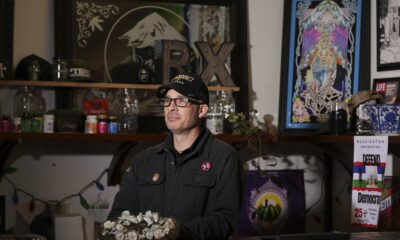
 Lifestyle2 days ago
Lifestyle2 days agoBelievers say microdosing psychedelics helps them. Scientists are trying to measure the claims
-
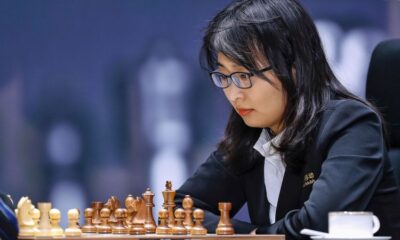
 Sports2 days ago
Sports2 days agoJu Wenjun: Chinese grandmaster makes history by winning fifth Women’s World Chess Championship
-

 Lifestyle2 days ago
Lifestyle2 days agoPicking a team from bars to beam and hoping for 10s: Fantasy leagues in gymnastics are a thing
-
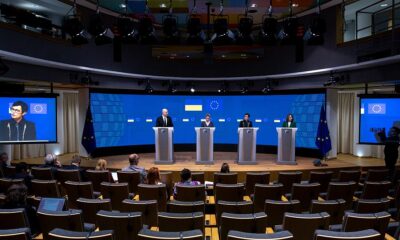
 Africa2 days ago
Africa2 days agoEuropean Union announces new asylum measures
-

 Sports2 days ago
Sports2 days agoArsenal reaches first Champions League semifinal in 16 years, with Inter Milan also advancing
-
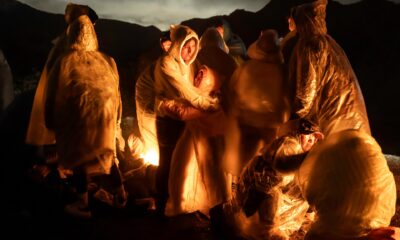
 Middle East2 days ago
Middle East2 days agoPalestinian photographer Samar Abu Elouf wins world’s top photo prize | Gaza News
-

 Sports2 days ago
Sports2 days agoBarcelona player Mapi León banned for two matches after appearing to touch the groin of an opponent




